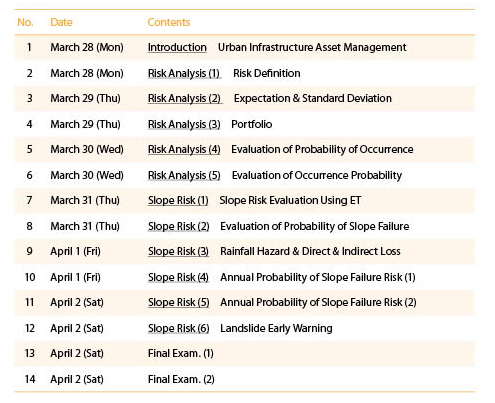Events
PME (Professional Master of Engineering) Intensive course
Date: March 28 - April 2, 2011
Venue: AITCV (Asian Institute of Technology, Centre in Vietnam), Ho Chi Minh City, Vietnam
Subject: Risk Management for infrastructure development and planning
Organized by:
Kyoto University Global COE Program "Global Center for Education and Research on Human Security Engineering for Asian Megacities"
Number of attendants: 7
Report 148
Program
Report
From March 28 to April 2, 2011, a six-day intensive course was held on Risk Management for Infrastructure Development and Planning, a course within the Professional Master of Engineering (PME) program offered to practitioners, at the Asian Institute of Technology in Vietnam (AITVN), Ho Chi Minh City, a satellite center of the Asian Institute of Technology (AIT), one of the overseas bases of the Kyoto University Global COE Program "Global Center for Education and Research on Human Security Engineering for Asian Megacities (GCOE)."
Among the four research fields of the GCOE program (Urban Governance, Urban Infrastructure Management, Health Risk Management, and Disaster Risk Management), I serve as a research field leader of Urban Infrastructure Management. The focus of the course was one of the disciplines in this field, geotechnical infrastructure asset management. The course was held according to the agenda given in Table 1, with each lecture consisting of a 90-minute session for a total of 21 hours including the final exam. As text material, I used a publication I compiled for the GCOE program, Geotechnical Infrastructure Asset Management (Second Edition).
[Table 1]

This intensive course was the second of its kind, following the first in September 2009. In the previous course, all participants were professional engineers with a keen interest in not only theories but also practical application. With this in mind, in each lecture I distributed practical exercises to be solved using Excel software, which were highly welcomed as they both furthered understanding and could be used in real-life business. I firmly believe that winning the participants' understanding, even in an introductory course for practitioners, is valuable in spreading knowledge about the field in the future.
During the course, on March 29 the AITVN held a conference on Geotechnical Engineering in the Context of Climate Change for university faculty members, government officials, and engineers. I gave a special lecture titled "Monitoring and Early Warning of Landslides: Experiences in Japan and Thailand" and spoke about the in situ monitoring I conduct in Thailand as part of the GCOE program, and the early warning system I propose for landslides. The proposal, which reflects the increasing frequency of slope disasters in Southeast Asia due to variations in rainfall pattern as a consequence of climate change, received many responses and set in motion an active question and answer discussion.
I plan to continue grasping opportunities like this to spread knowledge about relevant fields in Asia and to share information from the perspective of human security engineering.
